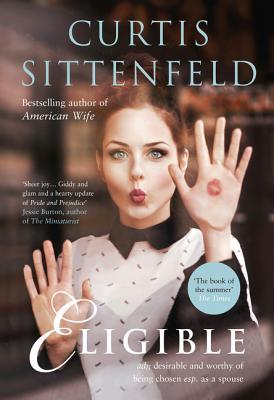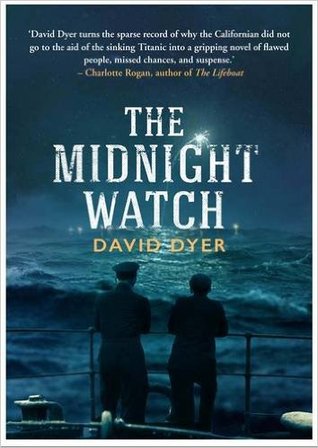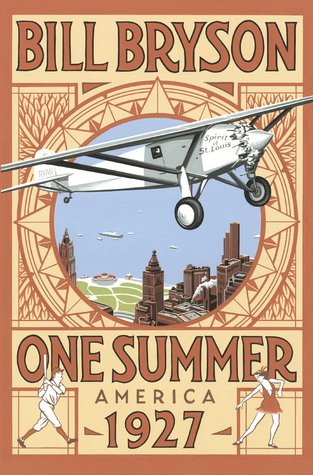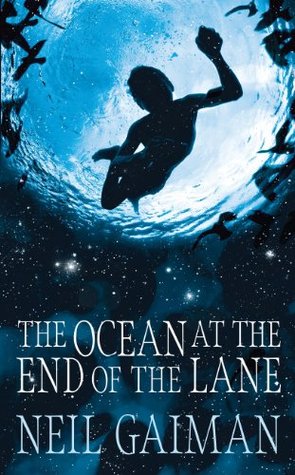Another month, another wrap up!
March madness at the day job, combined with a mid-month reading slump, did lead
to March being a slightly less productive reading month than January and
February in terms of physical reading. Truth be told, I was just too tired when
I walked in the door at the end of the day to do much more than veg out with
some YouTube videos or catch up on some TV, so reading was largely consigned to
weekends and days off. I was saved by audiobooks and got a couple of really
great listens in this month however, starting with…
I’ve been listening to this one
on audio for a couple of months – it comes in at just over 17 hours – on my way
to and from work and it’s a great book to dip into and out of whilst on the go,
as well as being suitable for listening to in larger chunks. The book is an
examination of the events of one summer that, Bryson argues, changed the face
of America and forged the world power that we know today.
Whilst large in scope, Bryson
does an excellent job of narrowing his topic into manageable chunks so that,
before you know it, you’ve covered Charles Lindbergh and the birth of the
aviation industry, Babe Ruth’s home run record, the seeds of the Great
Depression and the growing concerns about the connection between fascism and
eugenics and all without breaking a sweat! He does an excellent job of joining
the dots between seemingly unconnected events to create a picture of the
atmosphere and energy within America at the time in order to give a real sense
of this period of great change and progress in the country.
If I had one criticism it is
that, on occasion, Bryson can leave the reader (or listener, in this instance)
hanging for a few chapters before picking up a particular thread of the ‘story’
again. Whilst this would probably be fine in a print book – you could just
flick back a few pages and re-cap – it did leave me foundering on a couple of
occasions as I struggled to remember exactly what had been said about the Sacco
and Vanzetti case and why it was important. That said, it’s pretty easy to pick
up the thread again after a couple of minutes so this is a relatively minor
point all things considered.
This is the second audiobook I’ve
listened to by Bryson (the first being his ‘Home: A Short History of Private
Life’, which I can also highly recommend) and I have to say I would definitely
listen to more. Bryson is such an engaging narrator of his own work that even
the driest subject matter comes fully alive with his warm and avuncular tones
really bringing out the humour, with and cynicism within the writing. And,
whilst by no means an exhaustive book, – Bryson is aiming to give an overview
for the lay reader rather than a detailed analysis for a history buff - I did
feel that the topics covered were done so thoroughly and came away with a
greater knowledge of American history at this period and how this impacted on
later world events.
Ah, the book that did a reading
slump create. Which is not to say this is a bad book because it most definitely
is not. A reflective account of the fate of American-Japanese citizens on a
small island off the coast of Seattle after the events of Pearl Harbour, this PEN/Faulkner
award winning novel is beautifully written and has clearly been crafted with a
great deal of dedication and research. Unfortunately, that didn’t stop me from
finding it terminally slow and, I’m afraid to say, somewhat dull.
The most frustrating thing for me
throughout was that this book really shouldn’t be dull. It features an
unexplained death, a murder trial, a bittersweet teenage love story, a
little-known historical event of some importance, a healthy dose of small town
intrigue and an examination of the psychological effects of combat packed into
its pages. But the pace, oh the pace!
Starting in the courtroom, in
which Japanese-American fisherman Kabuo Miyamoto is on trial for the murder of
a fellow islander, the book slowly (and I mean, s-l-o-w-l-y) moves between the
pre-war era, when tensions between Japanese settlers and islanders simmer below
the surface, through the events and repercussions of Pearl Harbour and back to
the present day when local reporter Ishmael Chambers is struggling with his
unrequited love for Kabuo’s wife, Hatsue, with occasional detours via extended
flashback to Ishmel’s time fighting in the Pacific and Hatsue’s life during
internment.
The style and tone of the writing
throughout is contemplative, with the author keen to ensure that the reader
understands just how sweet the strawberries grown on Kabuo’s farm taste and
exactly what the cedar tree that the young Ishmael and Hatsue conduct their
trysts in smells like. Which, if that kind of writing floats your boat,
probably makes this a beautifully written, reflective literary novel about
love, death and the echoes of the past. Unfortunately, for me, the pace was
just that little bit too slow and the writing just that little bit too
meditative. As a result, despite the clear skill involved in the writing, I did
find this book all too easy to put down and rather difficult to pick back up.
The blurb on the back, which
focuses very much on the court case aspect of the plot (actually more of a
framing device for the narrative than a plot strand in itself), did little to
help as it meant I went into the novel expecting something very different from
the book I read. I’m sure a lot of literary fiction lovers would really enjoy
‘Snow Falling on Cedars’ but I’m afraid that, for me, it was only the fact that
this was a book club read that prevented this being a DNF.
This was one of those books
picked up completely on a whim in my local library. A bold, attractive cover
design drew me in despite the fact that I had no idea who Jeremy Hutchinson was
or why I would want to read his Case Histories. Turns out that more people
should know who Mr Hutchinson is and that his Case Histories form a major part
of recent English legal history and have helped to shape the moral compass of
modern society.
During his career at the criminal
bar, first as a newly qualified defence barrister and later as a leading QC,
Jeremy Hutchinson was involved in some of the biggest trials of the 1950s, 60s
and 70s, including the defence of Christine Keeler (of the Profumo Affair) and
of the publishers of ‘Lady Chatterley’s Lover’. The cases covered in this book
are varied, ranging from Cold War spying scandals to discussions about what is
art and what is indecency. All of them provide examples of how the social and
moral attitudes of the nation shifted dramatically from the 1960s onwards and
Grant provides a lively discussion throughout of the ways in which societal
changes impacted the verdict of the courts (albeit that leading judges appear
to have been a little slow to catch on to the post-War zeitgeist) and
vice-versa. Each account is animated and entertaining, as the very best of
narrative non-fiction should be, and this makes a dry subject matter both
lively and interesting to the lay reader.
My only criticism would be that
Grant does, at times, lean a little too much towards hero-worship of his
subject – a fact that he openly acknowledges in his introduction to the
paperback edition – but this is a minor one for there is clearly much in Jeremy
Hutchinson’s career and character to admire. And besides, Grant does not claim
to be writing an independent biography but a social history and, in that, he
has done a very good job.
The audiobook that did a reading
slump end! A good friend of mine recently read this book and, during an
afternoon of enjoyable walking, recommended it very highly to me. I’ve read
Gaiman before – ‘Stardust’ is an old favourite (the film is excellent too), I
reviewed his graphic novel ‘The Sleeper and the Spindle’ last year and I adore
‘Good Omens’, his collaboration with the late, great Terry Pratchett – but, for
some reason, I’ve never got around to his other works, despite owning a couple
of them. When I discovered that Gaiman himself read the audiobook version of
‘The Ocean at the End of the Lane’, I decided to experience it as an audio
rather than acquire the paperback and I’m so glad that I did. I am sure that
the book would be fantastic in whatever format you ‘read’ it but Gaiman is a
wonderful narrator, bringing out all the surreal darkness of this fantastical
tale.
The book is a modern fairy story
in the very best sense and, like all true fairy stories, that means it gets (as
Gaiman says in his introduction) very dark indeed. The unnamed narrator is
looking back on his life following the death of his father, returning to a long
ago summer when the family lodger stole their car and committed suicide in it,
thereby stirring up ancient powers that were better left undisturbed. With the
help of his enigmatic neighbour Lettie Hempstock and her family, our narrator
is pulled into a world of dark creatures and old magic, a world where it will
take all his courage to stay alive and to protect his family from the dark
forces within that are now trying to destroy it.
The contrast between wistful
portrayals of an idyllic country childhood and the growing sense of a dark,
unstoppable menace really drives this book, taking the reader into the very
heart of every childhood nightmare with no assurances that it will deliver you
safely to the other side. Only the reassuring presence of Lettie Hempstock,
truly one of the best female characters to have been created in modern
literature, allowed me to hope for a ‘happy’ ending to Gaiman’s deliciously
twisted tale.
Fans of Gaiman will, of course,
adore this book, which plays with ideas of memory and fable, magic and reality
and with the power of the stories we carry inside ourselves. For those not yet
familiar with Gaiman, the audiobook is probably a better introduction that I
imagine the reading experience would be – Gaiman’s narration hooks you from the
very first sentence – but you might be surprised how dark the story gets. I’d
say ‘Stardust’ would be a better jumping off point for new readers because
‘Ocean’, for all its dark deliciousness, is a little like jumping in at the
deep end!
More book club reading! In
contrast to ‘Snow Falling on Cedars’ however, this was a joy to read – an
homage to golden age crime fiction of the very best kind. Those who have
followed this blog for a while will know that I’m a sucker for a bit of crime
fiction but that I do prefer my crime to be on the cosier or classic end of the
crime spectrum. I can enjoy a brutal bit of Scandi noir as much as the next
person but too much by way of guts, gore and alcoholic detectives with broken
family lives doesn’t really do it for me.
‘The Human Flies’ is the first of
a series of Norwegian crime novels featuring the Detective Inspector Kolbein
Kristiansen (known as ‘K2’) and his precocious Holmes-like teenage compatriot
Patricia and takes as its jumping off point that classic staple of the
golden-age, the locked room mystery. Set in Oslo during 1968, Resistance hero
and former politician Harald Olesen has been found shot in his apartment, the
door locked and with no one having gone in or out of the building. Cue a classic
investigation of the buildings other tenants, involving red herrings, shadowy
goings on and even some international intrigue!
Bestsellers in their native
Norway, Lahlum’s ‘K2’ novels (the second of which, ‘Satellite People’ has also
been translated into English and has made its way onto my TBR), knowingly pay
tribute to the era of Christie and Sayers, as well as to the granddaddy of
classic crime, Mr Sherlock Holmes, without ever devolving into pastiche. For
fans of classic crime fiction, ‘The Human Flies’ will be delight to read – I
got through it in two sittings – and you’ll look forward to adding more K2
mysteries to your reading pile!
So that was March, more of a
struggle to read that to wrap up! On reflection, I did enjoy some very good
books but I think the reading slump made the month feel like a long one at the
time. April has already started well – I’ve been fortunate enough to have been
sent a couple of excellent books for review and have some exciting reads on my
TBR also. As always, please feel free to leave a comment to let me know what
you are reading, or to join in the conversation over on Twitter @amyinstaffs.
Happy Reading x
 For all the apparent simplicity
of her work, Jane Austen makes a very hard act for a writer to follow.
Charlotte Bronte might have labelled Austen’s work as “a carefully fenced,
highly cultivated garden, with neat borders and delicate flowers; but no glance
of bright physiognomy” but, for something apparently so structured, capturing
the essence of Austen’s light and playful writing is an extremely difficult
task. So it was with some trepidation that I decided to read Curtis
Sittenfeld’s ‘Eligible’, her take on arguably Austen’s best known novel ‘Prideand Prejudice’ – a book that happens to be one of my personal favourites. Sittenfeld
is an admirable writer – I enjoyed her novel ‘Prep’ immensely and have heard
only good things about ‘American Wife’ – but I’ve been burned by Austen
rewrites before.
For all the apparent simplicity
of her work, Jane Austen makes a very hard act for a writer to follow.
Charlotte Bronte might have labelled Austen’s work as “a carefully fenced,
highly cultivated garden, with neat borders and delicate flowers; but no glance
of bright physiognomy” but, for something apparently so structured, capturing
the essence of Austen’s light and playful writing is an extremely difficult
task. So it was with some trepidation that I decided to read Curtis
Sittenfeld’s ‘Eligible’, her take on arguably Austen’s best known novel ‘Prideand Prejudice’ – a book that happens to be one of my personal favourites. Sittenfeld
is an admirable writer – I enjoyed her novel ‘Prep’ immensely and have heard
only good things about ‘American Wife’ – but I’ve been burned by Austen
rewrites before. 



